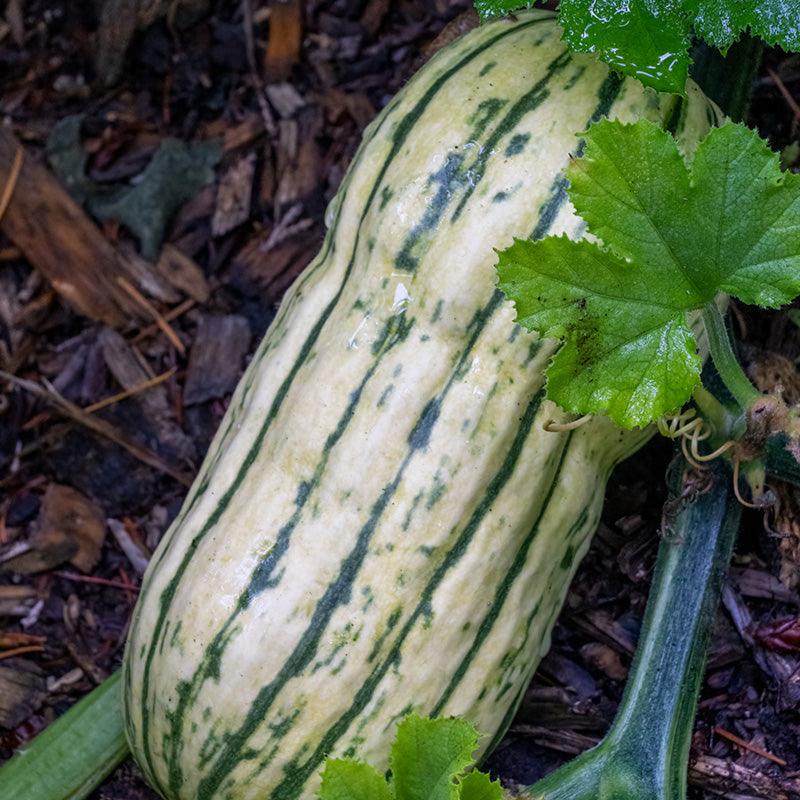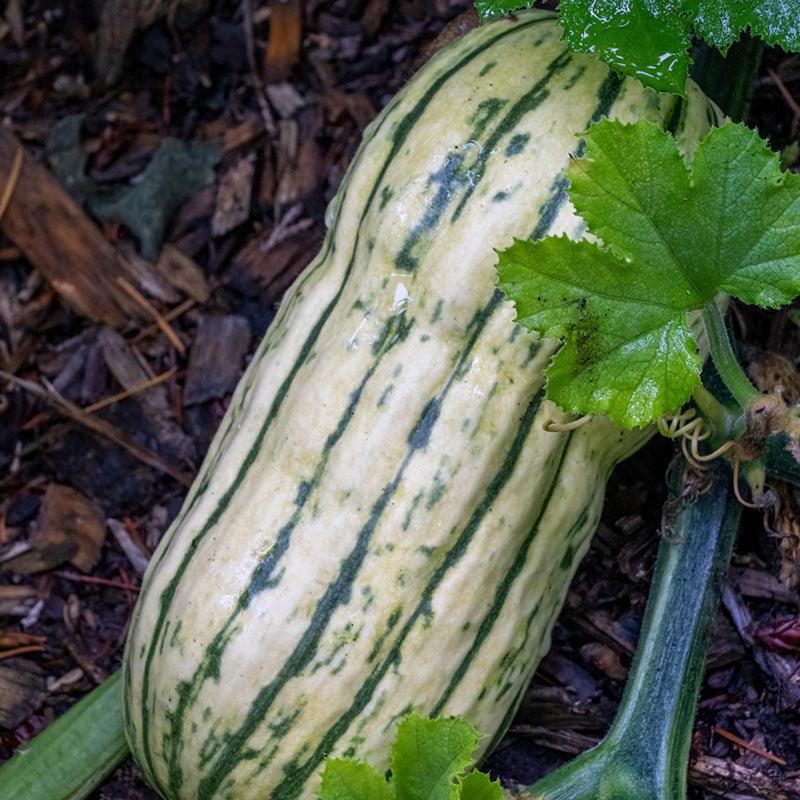Item Number: PV150
Organic Delicata Winter Squash
Sweet Flavor, Creamy Texture
Delicata squash, also known as sweet potato squash or peanut squash, is a delicious and nutritious winter squash variety prized for its sweet flavor, creamy texture, and easy-to-prepare nature. Belonging to the Cucurbita pepo species, Delicata squash is a versatile vegetable that can be roasted, baked, steamed, or sautéed, making it a favorite among home cooks and gardeners alike.
Sustainably grown in 2.75" pots
Preparing the Soil
Delicata squash thrives in well-drained, fertile soil with a pH level between 6.0 and 7.0. Before planting, prepare the soil by incorporating organic matter such as compost, aged manure, or leaf mold to improve soil structure and fertility. Ensure that the soil is loose, friable, and free from weeds and debris to provide an optimal growing environment for your Delicata squash plants.
Planting Delicata Squash
Delicata squash is a warm-season crop that requires full sun and warm temperatures to thrive. Wait until after the last frost date in your area before planting Delicata starts. Plant starts in well-amended soil, spacing them 2 to 3 feet apart in rows or mounds.
Watering and Care
Consistent moisture is essential for the healthy growth and development of Delicata squash plants. Water deeply and regularly, providing 1 to 2 inches of water per week, either through rainfall or irrigation. Avoid overhead watering to prevent foliage diseases, and water at the base of the plants to keep the soil evenly moist. Mulching around the base of the plants can help retain soil moisture and suppress weeds.
Fertilizing
Delicata squash plants benefit from regular fertilization to support vigorous growth and abundant fruit production. Apply a balanced fertilizer or compost tea every 3 to 4 weeks during the growing season, following package instructions for application rates. Be mindful not to over-fertilize, as excessive nitrogen can result in excessive foliage growth at the expense of fruit development.
Training and Support
Delicata squash plants are vigorous growers that require ample space to spread out. Consider using trellises, cages, or other support structures to train the vines vertically, which can save space and improve air circulation. Pruning the vines as needed can also help control their growth and prevent overcrowding, leading to healthier plants and better yields.
Pest and Disease Management
Like other members of the Cucurbitaceae family, Delicata squash plants are susceptible to various pests and diseases, including squash bugs, cucumber beetles, powdery mildew, and bacterial wilt. Monitor your plants regularly for signs of pest infestations or disease symptoms, and take appropriate action to control them. Practice crop rotation, use row covers, and apply organic pesticides or fungicides as needed to protect your Delicata squash crop.
Harvesting Delicata Squash
Delicata squash is typically ready for harvest 80 to 100 days after planting, depending on the variety and growing conditions. Harvest the squash when the rind has turned a creamy yellow color and is hard to the touch. Use a sharp knife or pruning shears to cut the squash from the vine, leaving a few inches of stem attached. Handle the squash with care to avoid bruising or damaging the delicate skin.
Storing Delicata Squash
Delicata squash can be stored for several months under the right conditions. Cure freshly harvested squash by placing them in a warm, dry location with good air circulation for 10 to 14 days. Once cured, store the squash in a cool, dry place with temperatures between 50°F and 55°F and relative humidity of 50% to 70%. Check the squash regularly for signs of decay and use any damaged or soft squash promptly.
Growing Delicata Winter Squash can be a rewarding experience, offering delicious and nutritious fruits that can be enjoyed throughout the winter months. By following the guidelines outlined in this guide and providing proper care and attention, you can cultivate a bountiful harvest of sweet and flavorful Delicata squash that will delight your taste buds and nourish your body.




Check Your Zone Compatibility:
Compatible with your zone.
Growing Zone for

Our Guarantee To You
Since 1976, we've served our customers at every stage of growing. Please contact us at any time. We are happy to support and assist you.
Shipping Information
Shipping Information
Cannot ship to the following states: AK, HI, PR, VI, GU
Shipping Weight: 0.5 lb
Features
Features
- Grow on a Trellis
- Open-Pollinated
Characteristics
Characteristics
Planting & Care
Planting & Care
Soil & Water: Provide squash plants with deep mounds of organic matter, rich soil, and heavy, even water. All squash are extremely frost sensitive, so use plastic mulches to heat soils in early spring and row covers to protect from frost at both ends of the growing cycle, especially in short growing seasons.
Planting & Growing: Plant starts in late spring or early summer, once the soil has warmed up to at least 70°F (21°C). Space plants 2 to 3 feet apart in rows spaced 4 to 6 feet apart to allow for adequate air circulation.
Harvesting & Storage: Harvest when the fruits have turned a deep solid color and the rind is hard. Harvest the main part of the crop before heavy frosts hit your area. Cut squash from the vines carefully leaving two inches of stem attached. Unlike many winter squash, Delicata can be used right after harvest. No curing is necessary.
Useful Information
Useful Information
Guarantee
Guarantee
We guarantee the perishable items we sell to be in good, viable condition when we sell them. Perishable items include, but are not limited to, garlic bulbs, flower bulbs, seed potatoes, onion sets & transplants, potted or bare root trees, vegetable crowns, etc. If your perishable item arrives in substandard condition, take photographs and please contact us within 3 days of the purchase date (or delivery date) and we will provide you with a refund of the purchase price (excluding shipping costs), or a replacement. Accordingly, we urge you to open any boxes marked as ""Perishable"" immediately upon receiving them and inspect the shipment thoroughly (do not crack open heads of garlic, we do not accept claims on cracked garlic). Because some perishable items can deteriorate very quickly, we cannot accept any claims beyond the 3-day time frame as it becomes too difficult to determine if these items were delivered in substandard condition, or if they turned into such substandard condition because of having been improperly cared for or stored once delivered.
Share


